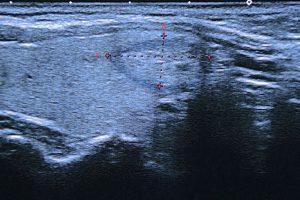Duke Endocrinologist Combines Real-Time Imaging With FNA of Thyroid Nodules

Combining ultrasonography and fine needle aspiration (FNA) of thyroid nodules, Duke Health endocrinologist Sara Ahmadi, MD, offers patients a convenient, one-stop setting for diagnosis and consultation.
In most settings, patients with thyroid nodules are asked to make separate appointments for imaging and biopsy. These visits often occur before the patient ever consults with an endocrinologist.
However, Ahmadi combines real-time ultrasonography with FNA during a patient’s clinic visit. Patient communication and expediency, Ahmadi says, are the greatest benefits of pairing real-time imaging with FNA during a single clinic visit.
“Patients prefer the convenience,” she says. “The setting gives us an opportunity to discuss the findings in real time, talk about next steps, and even change treatment plans based on what I’m seeing.”
Ahmadi, who earned an endocrine certification in neck ultrasound, came to the Duke Division of Endocrinology, Metabolism, and Nutrition after managing a thyroid ultrasonography and endocrine neoplasia clinic at the University of Texas Health Science Center at San Antonio.
Ahmadi’s experience with ultrasonography allows her to evaluate specific features in thyroid nodules that may either raise concerns or alleviate worries. These findings may help determine the need for FNA, which can be performed at the same time.
“After the procedures, I generally have an idea of the risk and can communicate to the patient what I’ve seen and what it means for his or her care,” Ahmadi says.
Some patients with thyroid conditions present with more complex issues that require a comprehensive assessment. As a member of the Duke Endocrine Neoplasia multidisciplinary team, Ahmadi often sees patients in conjunction with Duke endocrine surgeons Julie Ann Sosa, MD, Sanziana Roman, MD, Randall Scheri, MD, or Michael Stang, MD. The collaboration contributes to a comprehensive consultation, evaluation, and treatment plan prepared during the visit.
Ahmadi’s practice is designed as a patient-centered environment. As a member of the patient affairs and education committee of the American Thyroid Association, she regularly sees and adapts new techniques to benefit patients.
“I try to be an active listener and focus on the patient’s concerns and questions,” Ahmadi says. “I believe it is important to offer context and therapeutic options based on the results and future treatment.”